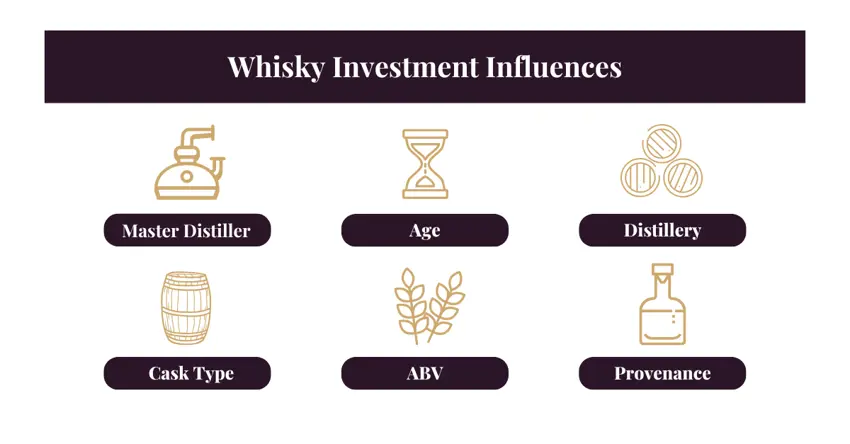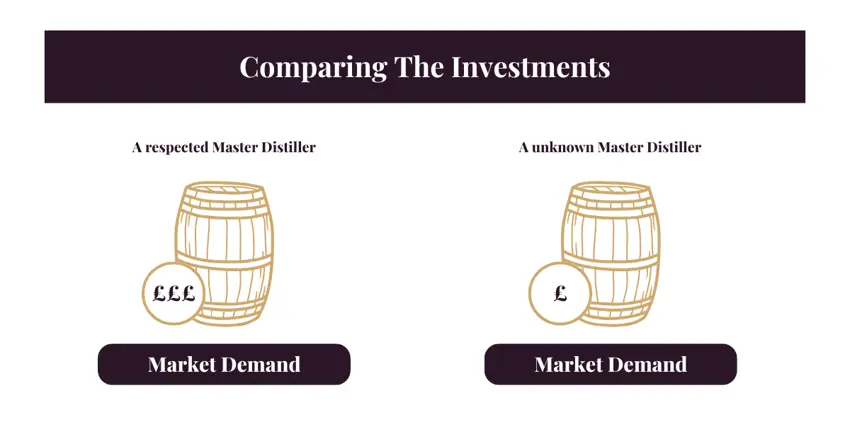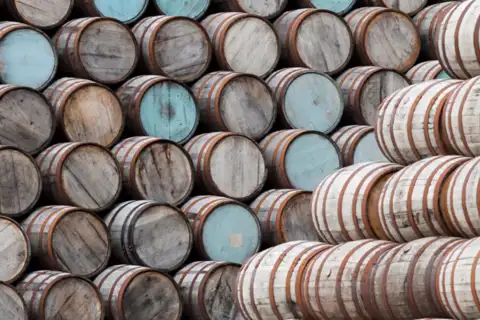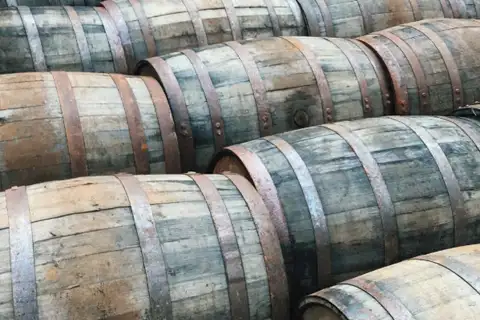Master Distiller: How Craftsmanship Shapes Whisky Value
Discover how a Master Distiller influences whisky cask quality, brand reputation, and investment value. Learn why their craftsmanship matters.
Cask Trade
Table of contents
- Introduction
- What Is A Master Distiller?
- How Does A Master Distiller Impact Whisky Quality
- What About Brand Reputation?
- Let's Compare
- Why Does It Matter For Alternative Investment?
- Conclusion

Master distillers tend to be overlooked in the whisky process but their influence is as crucial as any other factor, such as age, distillery and cask type, to name a few.

The Master Distiller is the creative spirit (excuse the pun) behind whisky. The technical details of a cask are not to be argued with as they are quantifiable numbers, like the ABV is the ABV (Alcohol By Volume), there’s no changing that.
However, from the ingredients to the distillation process a master distiller uses their knowledge and whisky craftsmanship to create a product that’s unique, helping to increase demand.
What Is A Master Distiller?
Let’s get into the details of who a Master Distiller is. Similar to that of a master chef or a prestige winemaker, master distillers are a huge part of how whisky tastes. They balance science and art, and as a result they shape the identity, style and consistency of a spirit.
In detail this means that they are responsible for selecting the ingredients, designing the distillation process, and choosing the right cask types in order to develop a specific flavour. The master distiller ultimately influences how the market perceives the whisky’s quality, uniqueness and long-term desirability.
Where authenticity can drive demand, the name and reputation of the master distiller can have a big impact on the relative whisky cost when it comes to market.
It’s essential that investors understand a distiller's role in identifying high-potential casks and making smart investments.
How Does A Master Distiller Impact Whisky Quality
Earned through decades of experience, being a Master Distiller means having both deep technical knowledge and an unmatched understanding of how to craft a unique spirit.
Many think that they purely deal with the distillation process but their responsibilities span the entire Scotch whisky production process, from grain to glass. Recipe formulation is one of the most crucial aspects of this, focussing on the blend of grain, water source, fermentation duration, and yeast strain. This combination defines the distillery’s signature character and style.
When it finally comes to the distillation process the distiller will make a call on how the spirit is cut. This focuses on deciding which parts of the alcohol are retained for aging and which are discarded. It may seem a small part but this decision will help shape the taste and texture of a new spirit. Even a small change can dramatically change the flavour profile.
When we progress to the cask stage the Master Distiller’s influence is essential. Balancing creativity and calculated investment the distiller will choose between American Oak, Sherry Butts, or more experimental finishes (like port, rum, or wine casks). Their vision is an anticipation of how the spirit is likely to interact with the wood, temperature and time. Often they are predicting flavour profiles decades ahead - this is why it takes years to develop the knowledge to become a master distiller.
The last focus for the distiller will be on quality control. This means regular sampling and cask management to ensure that the aging spirit is progressing as desired. This process allows them to make a call on when the cask is ready.
What About Brand Reputation?
Brand reputation is a key mark of relative whisky value. Depending on the whisky, a good deal of brand identity can lie in the vision and credibility of the Master Distiller.
The prestige of a Master Distiller can significantly enhance a whisky’s commercial reputation. Icons like Jim McEwan, who revitalised Bruichladdich, and later launched Ardnahoe, or Dr. Rachel Barrie, the first female Master Blender in Scotch whisky and the creative force behind GlenDronach and BenRiach, are household names among serious collectors. Their involvement in a whisky cask is often a mark of an excellent professional standard that commands respect, attracting buyers and elevating market interest.
This in turn translates into a higher perceived value and greater resale potential for whisky cask investments. In plenty of cases limited edition bottlings or single cask releases by respected distillers equal high demand, quick sales and higher prices.
A cask is not just a cask. It’s a cask that’s been carefully aged for 10 years in an oak barrel, having been carefully crafted by a master who has learnt their trade over decades in order to create excellence. Storytelling is a huge part of creating interest for investors. Couple this with Master Distillers moving to new ventures or retiring and their creations then become part of a limited catalogue, driving up whisky value.
At sale the impact of the Master Distiller will be reflected in the price. Investors are savvy and will seek out casks with specific individuals associated as they tend to possess premium prices and show greater resilience to market fluctuations.
Let’s Compare
To really showcase the effect of the master distillers on whisky cask investment we have two examples to share with you:
Comparison 1: The Jim McEwan Era at Bruichladdich
- A 2006 Bruichladdich 1st Fill Bourbon Barrel distilled under McEwan's leadership sold in 2023 for £17,500, with an estimated bottling value of £35,000+.
- A comparable 2006 Caol Ila cask (also 1st Fill Bourbon) sold within the same time frame for £13,000, despite similar age, provenance, and ABV.
Comparison 2: The Billy Walker Era at GlenAllachie
- A 2018 GlenAllachie Sherry Butt (under Walker’s direction) offered at auction in 2024 sold for £14,800, a strong figure for a relatively young cask.
- In contrast, a 2018 sherry butt from a lesser-known Speyside distillery with no high-profile Master Distiller fetched £9,800, despite nearly identical specs.

These comparisons showcase that a cask curated by a recognised Master Distiller enjoys greater demand, and strong resale opportunities.
Why Does It Matter For Alternative Investment?
The role of the master distiller is crucial in understanding its potential performance, it can be the difference between predictable resale value and one that underperforms.
Reputation tends to equal market confidence. Like vintage wine, provenance matters, whether it’s sold to independent bottlers, private collectors, or at auction buyers have reassurance that the liquid meets a certain desired standard.
When it comes to whisky investment the decision is also mixed with both logic and emotion. Whisky takes years to develop so the story behind it can be just as important as the logic.
It’s also important to ensure that you are future-proofing your exit strategy. Distilleries can go in and out of favour but a Master Distiller’s legacy tends to grow in value. This means a reasonably priced cask now could be worth a lot more in future once they retire or make a job move.
Conclusion
The quality of a whisky is no accident, it is the outcome of a thousand decisions, each guided by the vision and experience of a Master Distiller. From raw ingredients to the finished dram, the Master Distiller is responsible for balancing time-honoured tradition with careful experimentation to achieve both consistency and character in every drop.
For investors seeking not only returns but also lower risk and greater flexibility, evaluating the influence of the Master Distiller should be a core part of any cask acquisition strategy. It’s not just about spirit quality, it’s about who shaped that spirit, and how that story can help your cask stand out in a competitive and increasingly story-driven market.

Whether you're a seasoned or first-time investor we can help you understand the artistry of the casks we have available. If you’d like to take your investment to the next level, register with us today to gain full access to our live stock list!


